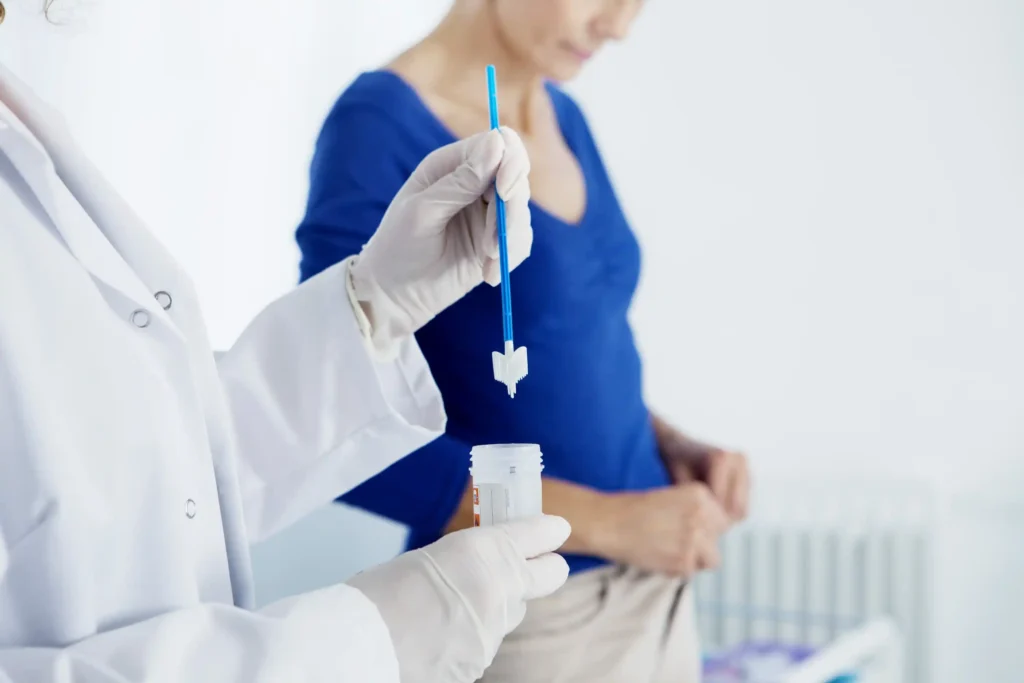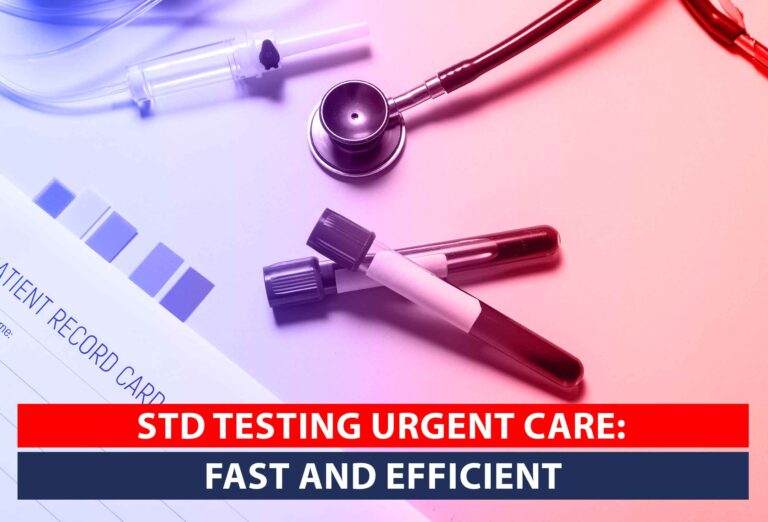You may be getting your first Pap smear, or it’s probably a part of your health check-up, which you get once in a while. Still, it’s normal to feel a little nervous in both cases. You can make this process more comfortable by knowing exactly the things to expect and prepare for the test.
A Pap smear is a simple test that you take to detect cervical cancer and other abnormalities related to it. In this blog, we’ll guide you through everything you need to know about a Pap smear. We’ll also discuss the abnormal test results and the next steps to take for women’s urgent care.
What Is a Pap Smear and Why Is It Important?
A Pap smear is a quick procedure to screen for cervical cancer. A healthcare provider collects cells from your cervix. The purpose is to find abnormal cell changes that can result in cancer if you don’t take proper treatment for it. Moreover, this test can identify infections or conditions such as HPV since it has a relation to cervical cancer. It’s extremely important to take this test regularly as preventive healthcare for women.
How Often Should You Get a Pap Smear?
A gynecologist usually recommends a Pap smear every three years if you’re between 21 and 29. You should take it every five years after you turn 30. However, your doctor may ask for more frequent screenings in case you have a history of abnormal results or you’re also due for STD testing.

Preparing for Your Pap Smear Appointment
You feel more at ease during the exam when you’ve prepared for the test properly. Let’s have a look at the checklist to make sure you’re fully ready:
1. Schedule Your Appointment at the Right Time
Wondering if you can get a pap smear during your period or not? Ideally, you should schedule it about 10-20 days after the first day of your last period. This way, your cervix is most accessible. Moreover, the blood or mucus won’t interfere with the results.
2. Avoid Sexual Activity Before the Test
You should avoid sexual intercourse for at least 24 to 48 hours before your Pap smear. This will be really helpful to make sure that the sperm or other substances don’t influence your results.
3. Refrain from Using Vaginal Products
You need to avoid using tampons or even vaginal creams for at least 24 hours before your test. These products can wash away or alter cells on the cervix, which can result in inaccurate results.
4. Wear Comfortable Clothing
You should wear loose and comfortable clothing on the day of your testing. The clinician may ask you to undress from the waist down. Therefore, you can make your experience more comfortable by wearing something easy to remove.
5. Don’t Worry About Shaving or Grooming
There’s no need to worry about grooming before your Pap smear. Your doctor will focus on the exam only. They’ll not be looking if you’ve shaved or groomed.
6. Eat Light Before Your Appointment
You may feel more comfortable during your appointment if you eat a light meal before. Hence, you should avoid heavy meals or caffeine since you can experience a jittery feeling after that.
What to Expect During a Pap Smear
The thought of this test can feel intimidating. However, the procedure is really simple and you generally need just a few minutes. Here’s a breakdown of the happenings during the test, starting from the moment you lie on the exam table to the completion of the cell collection.

Step-by-Step Breakdown of the Procedure
Your healthcare provider will gently insert a speculum into your vagina when you’re in position on the exam table. The purpose is to hold it open and allow them to view your cervix. The speculum may cause some mild pressure. Still, it should not be painful. Once the speculum is in place, they will use a small brush or spatula to collect a sample of cells from your cervix. The procedure is quick and only takes a few minutes.
What Does the Speculum Do?
The speculum is a tool that opens the vagina so the healthcare provider can see your cervix clearly. The pressure you feel is normal and is a necessary part of getting a good sample for testing.
The Cell Collection Process
Your provider will use a small brush or spatula to scrape the surface of your cervix gently. No doubt, you may feel a bit of mild discomfort or cramping. Nevertheless, the actual cell collection is over quickly. In fact, most women report that the procedure is uncomfortable but not painful.
Common Sensations and Discomfort During the Test
The most common sensations during this procedure are mild pressure and some discomfort as a professional inserts the speculum to collect the cells. You may also experience slight cramping or a brief “pinch” when they take the sample. The discomfort is generally short-lived, and you’ll be done with the entire procedure within 5 minutes.
Decoding Your Pap Smear Results
It can feel quite overwhelming the time you receive your test results specifically if the outcome is abnormal. However, you must know that an abnormal result doesn’t always mean something serious. Let’s break down what different results can indicate and the steps you may need to take next.
Types of Pap Smear Results: What Do They Mean?
Pap smear results fall into several categories. It depends on the severity of the abnormalities that you’re having:
- Normal: No detection of abnormal cells. Continue with your regular screening schedule.
- Atypical squamous cells (ASC): Mildly abnormal cells. These usually don’t require immediate treatment, but you should monitor them.
- Low-grade squamous intraepithelial lesion (LSIL): Early changes in cervical cells, often because of HPV.
- High-grade squamous intraepithelial lesion (HSIL): More serious changes in cervical cells that may need further evaluation and possibly treatment.
Cancer: Abnormal cells can indicate cervical cancer in rare cases. However, cancer is usually really treatable in early stages even if you detect it.
What Does an Abnormal Pap Smear Mean?
An abnormal result does not specifically mean you have cancer. It could point that your cells have changed & you need further testing to find out the cause of your abnormality. The most common cause is human papillomavirus. It’s a common virus that can cause changes in your cervical cells. Other causes may be an ovarian cyst, infection or inflammation.
Common Causes of an Abnormal Pap Smear
A variety of factors can result in an abnormal test result. It can be because of cervical dysplasia, herpes or yeast infection. Let’s have a look at the most common causes:
- HPV: This is the most common cause of abnormal Pap smears. It’s specifically true for high-risk strains of the virus that can cause cell changes in your cervix.
- Infections: Yeast infections, bacterial vaginosis, or sexually transmitted infections (STIs) can lead to inflammation. For instance, chlamydia or gonorrhea. It might show up as an abnormal result.
- Cervical Dysplasia: Abnormal cells in the cervix, often due to HPV may progress to cancer if you don’t treat them properly.

What Happens After Your Pap Smear?
You might be wondering what happens next once your test is complete. The good news is that the procedure is quick. Now it’s all about waiting for your results and comprehending their meaning for your health..
When Will You Get Your Results?
The results of this test are generally available within a week or two. Your healthcare provider will contact you with the results. If they don’t reach out, it usually means everything is normal. On the other hand, they will inform you and explain what additional steps might be necessary if your results are abnormal.
What Should You Do if Your Results Are Normal?
There’s no need for an immediate action plan in case your results are normal. Your doctor will continue to monitor your cervical health as part of your regular health screenings. They’ll advise you to return for another Pap smear in 3 to 5 years. Still, it’s according to your age and health history.
What If Your Results Are Abnormal?
You don’t need to panic even if your results are abnormal. Most abnormal results are because of HPV or minor cell changes that you can get treatment for effectively. Your healthcare provider may recommend further testing. For example:
- HPV testing to see if high-risk strains of the virus are present.
- Colposcopy for having a closer examination of the cervix.
- Biopsy to determine the nature of your abnormal cells.
Conclusion
A Pap smear is a really important part of a woman’s healthcare routine. You can detect complications early and monitor your cervical health. Understandably, you can have a lot of questions about the process and the results. Just remember that abnormal results don’t naturally mean that you have something serious. You should follow up with your healthcare provider even in that case for further testing. In fact, you need regular screenings for good health. Therefore, schedule your next appointment with NovaMed urgent care to take charge of your well-being.






